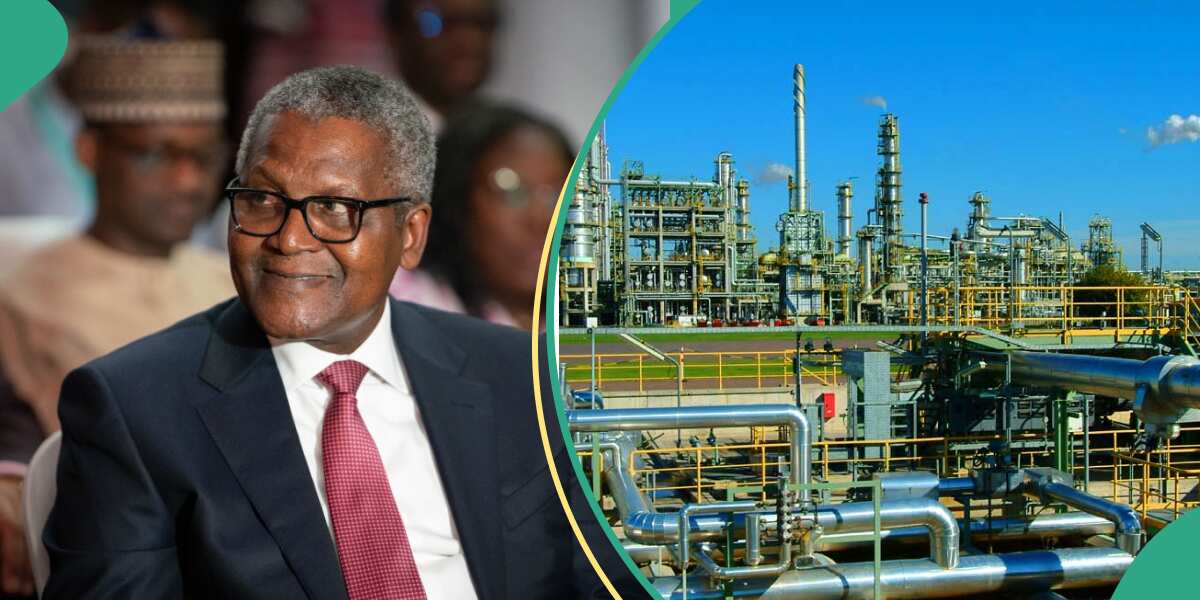Oil Companies Give Dangote Tough Conditions to Supply Crude Oil to the Refinery Ahead of Operation
Quote from Alex bobby on November 6, 2023, 8:34 AM
Dangote Refinery Faces Tough Conditions from Oil Companies for Crude Supply
Dangote Refinery, set to become Africa's largest oil processing facility, is encountering formidable conditions from oil companies as it prepares for its imminent operation. This crucial development places the massive project's future success in the balance.
Aliko Dangote's ambitious refinery project, situated in Lagos, Nigeria, has been a beacon of hope for the country's energy landscape, promising to reduce its reliance on oil imports and bolster its economic growth. With a refining capacity of 650,000 barrels per day, it is poised to revolutionize the West African oil industry.
However, recent negotiations between the Dangote Group and major oil companies have revealed a complex web of challenges. These oil giants are demanding strict conditions for the supply of crude oil to the refinery, raising concerns about the sustainability of Dangote Refinery's operations.
One of the primary conditions set by these companies is a long-term supply agreement that spans several years. They argue that the commitment is essential to secure their investment in infrastructure, including pipelines and storage facilities, which would be dedicated to the refinery. Such a commitment, though, could potentially tie Dangote Group to fixed prices, leaving them vulnerable to market fluctuations.
Furthermore, the oil companies are pushing for a substantial upfront payment for the crude supply. This demand may place significant financial strain on the Dangote Group, which has already invested billions in the refinery project. Meeting this condition could jeopardize the project's long-term financial stability.
Environmental and regulatory concerns also play a role in these negotiations. Oil companies are insisting on compliance with stringent environmental standards and regulatory requirements, which could entail costly upgrades and adherence to strict emissions controls. These conditions are not only cost-intensive but could potentially delay the refinery's operational timeline.
Dangote Refinery's success is essential not only for Nigeria but for the entire African continent. It promises to transform the region's energy landscape, create job opportunities, and reduce the country's reliance on foreign oil imports. However, the formidable conditions set by oil companies represent a formidable challenge. The Dangote Group must carefully navigate these negotiations, balancing the need for crude supply with the financial sustainability of its ambitious project.
As the parties continue to negotiate, it remains to be seen how these conditions will impact the future of Dangote Refinery. Success in reaching a mutually beneficial agreement will be critical to ensuring that this flagship project achieves its full potential and contributes to the economic growth and energy security of Nigeria and the broader African region.

Dangote Refinery Faces Tough Conditions from Oil Companies for Crude Supply
Dangote Refinery, set to become Africa's largest oil processing facility, is encountering formidable conditions from oil companies as it prepares for its imminent operation. This crucial development places the massive project's future success in the balance.
Aliko Dangote's ambitious refinery project, situated in Lagos, Nigeria, has been a beacon of hope for the country's energy landscape, promising to reduce its reliance on oil imports and bolster its economic growth. With a refining capacity of 650,000 barrels per day, it is poised to revolutionize the West African oil industry.
Register for Tekedia Mini-MBA edition 17 (June 9 – Sept 6, 2025) today for early bird discounts. Do annual for access to Blucera.com.
Tekedia AI in Business Masterclass opens registrations.
Join Tekedia Capital Syndicate and co-invest in great global startups.
Register to become a better CEO or Director with Tekedia CEO & Director Program.
However, recent negotiations between the Dangote Group and major oil companies have revealed a complex web of challenges. These oil giants are demanding strict conditions for the supply of crude oil to the refinery, raising concerns about the sustainability of Dangote Refinery's operations.
One of the primary conditions set by these companies is a long-term supply agreement that spans several years. They argue that the commitment is essential to secure their investment in infrastructure, including pipelines and storage facilities, which would be dedicated to the refinery. Such a commitment, though, could potentially tie Dangote Group to fixed prices, leaving them vulnerable to market fluctuations.
Furthermore, the oil companies are pushing for a substantial upfront payment for the crude supply. This demand may place significant financial strain on the Dangote Group, which has already invested billions in the refinery project. Meeting this condition could jeopardize the project's long-term financial stability.
Environmental and regulatory concerns also play a role in these negotiations. Oil companies are insisting on compliance with stringent environmental standards and regulatory requirements, which could entail costly upgrades and adherence to strict emissions controls. These conditions are not only cost-intensive but could potentially delay the refinery's operational timeline.
Dangote Refinery's success is essential not only for Nigeria but for the entire African continent. It promises to transform the region's energy landscape, create job opportunities, and reduce the country's reliance on foreign oil imports. However, the formidable conditions set by oil companies represent a formidable challenge. The Dangote Group must carefully navigate these negotiations, balancing the need for crude supply with the financial sustainability of its ambitious project.
As the parties continue to negotiate, it remains to be seen how these conditions will impact the future of Dangote Refinery. Success in reaching a mutually beneficial agreement will be critical to ensuring that this flagship project achieves its full potential and contributes to the economic growth and energy security of Nigeria and the broader African region.
Uploaded files:


